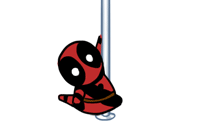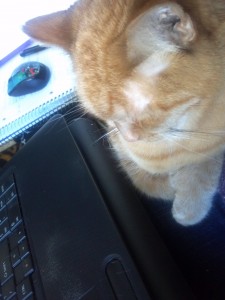Geek*Kon 2015 was a mixture of seeing old friends and making new ones. I did have a great time and these fans are doing everything they can to put on a great show. I was thrilled to see folks like Emma Bull, Greg Weisman, Christopher Jones, Will Shetterly, and Alex Bledsoe speak to up-and-coming writers, fans, and all around great people.
Rather than give a recap of every panel and anime-related item I purchased (*coughs* Jiji rocks!), I’d like to highlight some of the wonderful advice given during my Writing 101 panel. The panel consisted of Alex Bledsoe, Will Shetterly, Emma Bull and myself. Here are some of the nuggets of advice given during the panel that I hope inspires you to write your heart out. Please note that I made every attempt to attribute said advice correctly, and some of the comments are sub-attributed to Steven Brust. Rather than rehash many of the tidbits I’ve mentioned here on my blog, today’s spotlight is on the other authors and their words of wisdom.
- Point-of-view (P.O.V.) solves everything. Brust/Bull
- Story starts with your P.O.V. character. Shetterly
- Deal with the precipitating event as the first part of your story. Bledsoe
- What serves the story is what you don’t tell. Shetterly
- With respect to critiques and feedback from readers, “Worry about reader problems vs. reader solutions.” Shetterly
- I write first drafts to create a skeleton. Bledsoe
- With respect to revisions: “I pace around my house, reading the manuscript aloud.” Bledsoe
- Figure out what drafts are supposed to do. e.g. They can be systematic or intuitive. Bull
- Make the story more specific during revisions. Shetterly
- What really matters, is the story itself. Shetterly
- It’s better to write a bad first draft, than no draft at all. Shetterly
We also talked about info dumps and the Dread PrologueTM, and how many of the info dumps can be avoided by choosing the right character when selecting which character is telling the story. We also mentioned how it’s okay to suck (you’ve no doubt heard me say that before), and how the senses are crucial to add in layers of worldbuilding. For example, Bledsoe mentioned that a sense of smell can really make a big difference.
I hope today’s wrap-up inspires you to write, write, write! And remember, you’ll never internalize or finish what you start unless you sit down and simply…write. GOOD LUCK!
- Mood: Luxuriating in this damp, windy weather.
Caffeinated Beverages Consumed: Mostly managed!
Work-Out Minutes Logged Yesterday: HAH HAH HAH HAH HAH.
In My Ears: Tron Legacy soundtrack
Game Last Played: Kingdom Rush
Book Last Read: For research, not pleasure. Ergo…
Movie/TV Show Last Viewed: Frozen. Because in my house, it’s a horror movie.
Latest Artistic Project: Sewing project that turned out to be a pescatarian oni. Don’t ask! Am planning Halloween-related crafts, however.
Latest Fiction/Comic Release: Gods, Memes, and Monsters
Latest Game Release: Dread Names, Red List for Vampire: the Masquerade and Ghosts in the Black for the Firefly RPG.
Current State of Projects: Read my latest project update. A new one coming soon! SOON I SAY!


